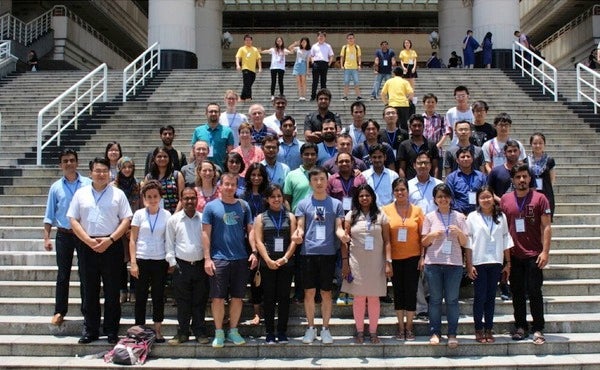Guangzhou 2017 Training School
Second ACAM Training School
Observations and Modeling of Atmospheric Chemistry and Aerosols in the Asian Monsoon Region
10-12 June 2017, Jinan University, Guangzhou, China

Click for larger image.
Over 40 students and 9 lecturers attended the Observations and Modeling of Atmospheric Chemistry and Aerosols in the Asian Monsoon Region on 10-12 June 2017 at Jinan University, Guangzhou, China. This training event was organized within the framework of the joint IGAC-SPARC activity, Atmospheric Composition and Asian Summer Monsoon (ACAM). The 3rd ACAM workshop, held 5-9 June 2017 at Jinan University, Guangzhou, preceded the training school. Specific goals of the training school were to provide (i) training of early career scientists on topics relevant to studying trace gases and aerosols in Asia particularly in connection with the Asian monsoon, (ii) to create a network of ACAM early career scientists, and (iii) to provide resources for improving their science and communication skills.
Participants in the training school represented 7 Asian countries (Bangladesh, China, India, Nepal, Pakistan, Thailand, Vietnam) and 3 European countries (Norway, Switzerland, United Kingdom), with over 1/3rd female participants. Participants were either current students (primarily graduate) or early career scientists within 3 working years of receiving their Ph.D., with interest in learning about observations and modeling tools for applications to ACAM research.
Lecturers at the school presented theory and practical information on their expertise, ranging from satellite remote sensing to aircraft observations to analysis of long-term datasets to global and regional modeling of trace gases, aerosols, and meteorological parameters in the Asian monsoon region. Dr. Tianjun Zhou (Chinese Academy of Sciences, China) presented two overview lectures on the Asian monsoon, associated air-sea interactions, and the role of anthropogenic activity on Asian monsoon circulation and rainfall variability. Jessica Neu (JPL/CalTech, USA) and Ritesh Gautam (EDF, USA) discussed satellite measurements and retrieval techniques of atmospheric composition, while Elliot Atlas (U. Miami, USA) and Sachin Ghude (IITM, India) presented methods for sampling trace gases from aircraft and ground-based instruments. Chiara Cagnazzo (ISAC, Italy), Federico Fierli (ISAC, Italy), Mian Chin (NASA/GSFC, USA), and Mary Barth (NCAR, USA) discussed global and regional scale modeling, transport processes and analysis of trace gases and aerosols in relation to the Asian region. Sachin Ghude also discussed emissions inventories and their evaluation.
A highlight of the school was the “Science and Communication Café”, in which 3 major topics were addressed. The first was a discussion and exercise on communicating science with the general public in the form of a press release. Participants were exposed to methods for effectively translating research findings, involving scientific terms, into non-technical and jargon-free language. The second topic discussed the organization of slides for oral presentations, for instance highlighting the logical balance between size and colors of text and figures and the importance of finishing a presentation with the summary/conclusion slide as the last slide, so that the audience can view the main points of the presentation during the question and answer period. The third topic was an exercise of creating a “science elevator speech”, a clear, brief message about a research finding and its broad significance (in a few moments akin to the time it takes for people to ride in an elevator from the bottom to top of a building). These were all interactive exercises with group presentations of press releases by the participants.
Other hands-on activities occurring during the training school were group tasks to propose an aircraft field campaign based on a topic relevant to ACAM, determine the type of instruments needed to address the objectives of the field campaign, and the modeling framework to forecast and analyze field campaign data. These hands-on activities created a collegial camaraderie among the participants and lecturers. The participants were enthusiastic about the “Science and Communications Café” and hands-on activities, suggesting that more time be spent on these practical exercises. They enjoyed the lectures on theory, which broadened their knowledge on observations and modeling. This training school significantly benefitted from the support of various sponsors (noted below) as well as the outstanding support from local student volunteers at Jinan University, which the participants were grateful for.
The lectures have been posted at the ACAM 2nd Training School website, https://www2.acom.ucar.edu/acam/guangzhou-2017-training-agenda, which is available to reach out to a broader audience. The ACAM Training Working Group web page also contains information on other training schools and resources associated with the ACAM topic.
Scientific Organizing Committee: Mary Barth (NCAR), Ritesh Gautam (IIT Bombay), Federico Fierli (ISAC/CNR)
Local Organizers: Prof. Xuemei Wang, Liuyi Zhou, Xuesong Geng